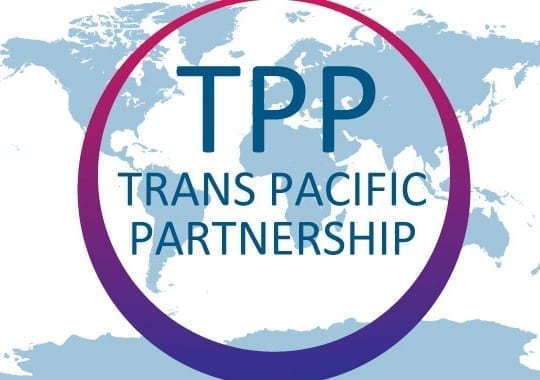Since 2010, a new free trade agreement has been in the works, known as the Trans-Pacific Partnership (TPP). While the agreement has some notable aspects, like it’s ability to “spur U.S. exports of mechanical and electrical equipment, advanced materials, pharmaceuticals and many other goods” by cutting tariffs and non-tariff trade barriers, some are concerned that the TPP might wreak havoc on the food safety standards here in America.
But what exactly is the TPP? For starters, it’s an agreement between 12 countries that currently make up about 40% of the world’s GDP. The countries include Australia, Brunei, Canada, Chile, Japan, Malaysia, Mexico, New Zealand, Peru, Singapore, U.S., and Vietnam, and even more countries have demonstrated an interest in joining later down the road. The overall intention of the agreement is to foster better trade relations between the America’s and the Asia-Pacific region of the world and will eliminate or greatly reduce tariffs and other trade barriers between the countries taking part in the TPP.
So what’s the big deal? What does the TPP have to do with food safety here in the U.S.? Well, some of the tariffs and other trade barriers that will be eliminated or reduced include restrictions on agricultural exports and food safety. Effectively, the TPP would “outsource domestic food inspection.” In fact, according to the agreement, “the exporting Party shall, when available and subject to its law, regulations, and policies provide a summary of the risk or safety assessment.” This could mean that importing countries who want to do things like inspect food, test for food safety, or warn consumers of unhealthy contents in food could be viewed as imposing restrictions by other countries who may not share the same food safety standards. Since the TPP would do away with these ‘restrictions,’ it will be more difficult for countries like the U.S. to uphold their food safety standards. Other regulations might also be seen as violations of the agreement rules, including:
- Food Additives
- Animal Drugs
- Pesticides and Herbicides
- GMOs and Transgenic Organisms

Another feature of the TPP that may negatively impact food safety standards is the agreement’s “Rapid Response Mechanism.” This feature grants exporting countries the ability to dispute export restrictions so that imports are carried out in a timely manner and that food inspections are “limited to what is reasonable and necessary, and what is rationally related to the available science.” Effectively, this will make it even more difficult to ensure that food imports are meeting safe food safety standards. Some even argue that this feature puts unimpeded trade above public health and food safety, even amid justified citizen concerns over things like safe food ingredients and the use of pesticides and herbicides on crops.
For citizens around the world who care about what goes into their food, how it’s being raised and inspected, and who’s inspecting it, the TPP is less than desirable. Perhaps in the future changes or amendments to the agreement will be made to ensure that food safety is something worth protecting.
Sources:
Trans-Pacific Partnership Raises Concerns About Safety, Quality of Imported Foods


Join the conversation!